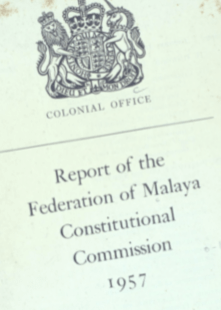In Part One, we read about the origins of the special position of the Malays in the treaties between the British Crown and the Malay Rulers, and the decision of the Alliance parties to continue that policy for at least 15 years after Merdeka. In this Part, we will consider the negotiations that led to the adoption of Article 153 in our Constitution.
The Federation of Malaya Constitutional Commission, comprising eminent jurists from across the Commonwealth and headed by Lord Reid, a British Lord of Appeal in Ordinary, was appointed jointly by the Queen and the Rulers of the Malay States. Its terms of reference included instructions:
To make recommendations for a federal form of constitution for the whole country as a single, self-governing unit within the Commonwealth based on Parliamentary democracy … which would make provision for:
…
(iv) a common nationality for the whole of the Federation;
(v) the safeguarding of the special position of the Malays and the legitimate interests of other communities.
Between June and October 1956, the Commission received written and oral evidence and held 118 meetings in Malaya, including meetings with members of the public and Government officers. The Report of the Commission was published in February 1957. On the special position of the Malays, the Commission referred to its terms of reference, and reported that:
[I]t seemed to us that a common nationality was the basis upon which a unified Malayan nation was to be created and that under a democratic form of Government it was inherent that all the citizens of Malaya, irrespective of race, creed or culture, should enjoy certain fundamental rights including equality before the law. We found it difficult, therefore, to reconcile the terms of reference if the protection of the special position of the Malays signified the granting of special privileges, permanently, to one community only and not to the others. The difficulty of giving one community a permanent advantage over the others was realised by the Alliance Party, representatives of which, led by the Chief Minister [the Tunku], submitted that—”in an independent Malaya all nationals should be accorded equal rights, privileges and opportunities and there must not be discrimination on grounds of race and creed …” The same view was expressed by their Highnesses in their memorandum, in which they said that they “look forward to a time not too remote when it will become possible to eliminate Communalism as a force in the political and economic life of the country”.
The Commission therefore recommended that the quotas existing on 1 January 1957 could continue for at least fifteen years after Merdeka Day, but that no new quotas could be created. After fifteen years, and at least every fifteen years thereafter, any remaining quotas would be reviewed and could be continued, reduced or discontinued by the legislature. As for reservations of land, such reservations as existed on 1 January 1957 under existing law could continue until replaced or discontinued by the State legislatures.
Draft Article 157, dealing with quotas, was inserted in the temporary and transitional section of the Constitution:
157.—(1) Notwithstanding anything in this Constitution where there was reserved on the first day of January, 1957, either by legislation or otherwise, any quota for Malays in—
(a) any branch of the public services, or
(b) the issuing of permits or licences for the operation of any trade or business, or
(c) the award of scholarships, bursaries or other forms of financial aid for the purposes of education,such quota may, subject to the provisions of this Article, be continued after Merdeka Day.
(2) If in any year there are insufficient Malays duly qualified to fill such quota, the quota shall be reduced for that year.
(3) After the expiration of a period of fifteen years from Merdeka Day but not earlier the appropriate Government shall cause a report to be made to the appropriate legislature as to whether the quotas be continued, reduced or discontinued; and after considering such report the appropriate legislature may continue, reduce or discontinue any quota; and, if a quota is not then discontinued similar reports shall be made to the appropriate legislature at intervals of not more than fifteen years.
The recommendation of the majority of the Commission can be seen to have closely followed the agreed position of the Alliance related in Part One of this series, except insofar as the Commissioners provided that the quotas could only be diminished after Merdeka and not increased. (Razak had submitted that in some areas, such as business and trade, there should be more reservations granted to the Malays, provided that in doing so nothing should be taken away from the non-Malays.)
 A separate note of dissent was entered by Mr Justice Abdul Hamid, despite the fact that he had previously himself drafted and agreed to recommendation of the majority. He recommended either that the special position of the Malays be a matter on which the Yang di-Pertuan Besar acted in his discretion without requiring legislation, or that the quotas should only be reduced or discontinued by a two-thirds majority of the legislature. Abdul Hamid was apparently operating under the belief that there would eventually be a non-Malay majority in Malaya. At his insistence, the Commission agreed to the requirement of a two-thirds majority for the abolition of Malay reservations by State legislatures, but they rejected a similar move for quotas.
A separate note of dissent was entered by Mr Justice Abdul Hamid, despite the fact that he had previously himself drafted and agreed to recommendation of the majority. He recommended either that the special position of the Malays be a matter on which the Yang di-Pertuan Besar acted in his discretion without requiring legislation, or that the quotas should only be reduced or discontinued by a two-thirds majority of the legislature. Abdul Hamid was apparently operating under the belief that there would eventually be a non-Malay majority in Malaya. At his insistence, the Commission agreed to the requirement of a two-thirds majority for the abolition of Malay reservations by State legislatures, but they rejected a similar move for quotas.
When the Reid Commission Report was published, the fifteen-year review provision provoked uproar among the Malays, as the Alliance had never made public this aspect of the Alliance agreement. The UMNO General Assembly in March 1957 resolved that there should be no time limit for the Malay special privileges. At the same time, the Chinese press criticised the Commission for creating two grades of citizens in Malaya.
An official Working Committee consisting of representatives of the Rulers and the Alliance parties and headed by the British High Commissioner was set up to consider the Reid Commission Report, while the Alliance set up its own sub-committee to come up with an agreed position. For the MCA, Tan Siew Sin expressed the view that the Reid Commission proposal accurately reflected the original Alliance position and that Article 157 needed to be carefully drafted to protect against abuse. However, the MCA was eventually persuaded to accept the redrafting of Article 157, reverting to the Alliance formulation of “reasonable” reservations at the discretion of the Government, and replacing the 15-year review with review “from time to time”. The MCA insisted only on the inclusion of a provision to the effect that Parliament could not “restrict or control any trade or business just for the sake of creating quotas for Malays”.
The MIC General Assembly in April 1957 resolved that the special position of the Malays should be continued for fifteen years, after which any safeguard or protection should be given to backward sections of the population irrespective of race, creed or community. However, MIC President VT Sambanthan was unsuccessful in getting the sub-committee to consider the MIC proposals, because they considered the issue to be closed.
In the Working Party, the representatives of the Malay Rulers stated that they preferred to stick to the Reid Commission draft of Article 157 because otherwise the guarantee of equality under Article 8 would lose its force. However, because of the political sensitivity of the issue, the position of the Alliance parties held sway. The Working Party also agreed to move Article 157 from the temporary and transitional section to the permanent section of the Constitution (where it would become Article 153). This meant that the special position could be continued or revived indefinitely by the Government of the day unless there was a constitutional amendment. However, the MCA representatives on the Working Party did not grasp the implications of the move until June 1957, by which time the Constitution had been all but finalised.
At the London Conference in May 1957, the Working Party redraft was accepted, although the British Government refused to accept the Chief Minister’s proposal for an extension of Malay reservations to Penang and Malacca. A compromise was instead adopted whereby each State was permitted to acquire land and set up trusts for the settlement of Malays.
In Part Three, we will consider Article 153 as it was finally adopted by the Working Party and the London Conference, and enacted by the British Parliament and the Federal and State legislatures.
(For more of the history of the formulation of our Constitution, see Joseph M Fernando, The Making of the Malayan Constitution (2002).)


Nice!